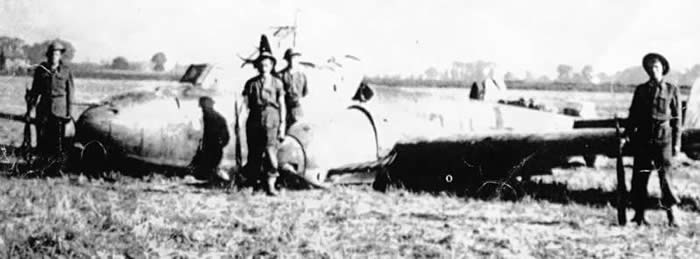
I was born in 1935 at Victory Cottages by Bakers Grave, Little Wakering.
When WWII was declared in 1939 I was 4 years old and had no idea what war and fighting, apart from the odd scrap with other tearaways was about but I was about to find out pretty quickly.
I had four brothers and three sisters. My two elder step brothers were called up for military service and served in different parts of the world. My oldest brother, Michael joined the Royal Air Force and was posted to India. My other brother, Philip joined the Army and was posted to Italy.
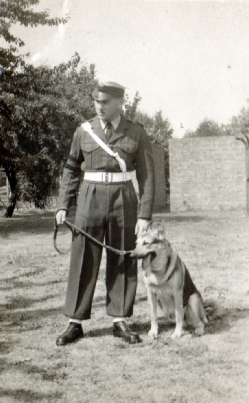 I was not old enough at that time but when I reached 18 I was conscripted to the Royal Air Force for National Service. I served two years as a RAF Police dog handler and worked with Air Dog 4308 Rover, a big bold beautiful but fierce grey sable Alsatian.
I was not old enough at that time but when I reached 18 I was conscripted to the Royal Air Force for National Service. I served two years as a RAF Police dog handler and worked with Air Dog 4308 Rover, a big bold beautiful but fierce grey sable Alsatian.
Back to earlier days, my first encounter was when gas masks were issued. I was petrified. My parents put them on and looked like monsters but after many trials and tribulations accepted them. Very young children had one with a Mickey Mouse mask while babies had one like a gas proof suit of clothing. Everyone had to carry them at all times.
Everywhere was BLACKED OUT. No one was allowed to show a light at night in case it was seen from the air by the enemy. Military vehicles had just a lighted slit in the headlight, I believe had no rear lights but there was a white painted area underneath which was illuminated by a small light to be seen from behind only. This was called a convoy light.
All sign posts were removed so as to confuse the enemy if we were invaded. My father was a countryman, like most countrymen he owned a shotgun which stood just inside the back door. He dug a trench across our front garden which faced east and stockpiled cartridges. His theory was if we were invaded the invading forces would come from the direction of the beaches at Shoebury. He intended to stand in his trench and shoot the enemy until he himself fell. By great fortune we were not invaded and this theory was never put into practice.
Apart from very essential users there was no petrol available. Every drop produced was needed for the war effort. No cars were made. All car factories changed to building military vehicles and of course aircraft. As little petrol was available there were very few cars driven on the road.
I mentioned gas masks. There a number of gasses which could have been dropped on us but my recollection was mustard gas was one of the most feared due to its burning properties. To combat this if I have got it right coloured boards were erected which would change colour if gas was present. Coupled with these water tanks were built at strategic locations. If gas was detected the drill was to wash in the tanks.
These could also be used to extinguish fires by the Auxiliary fire service or by bucket chain. Air raid shelters were built on street corners and in school playgrounds. My father built an air raid shelter in our back garden by digging a large hole and sinking a garden shed into the hole and then covering with soil. Next door had a female greyhound named Jip who we noticed one morning had taken up occupation of the shelter with a litter of pups.
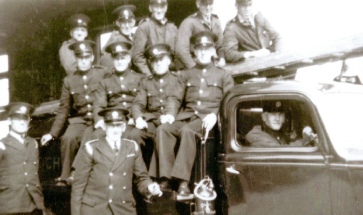 A new Fire Station was built at Great Wakering and housed a fire tender which used to tow a water pump. Upstairs was accommodation. The firemen were part of the Auxiliary Fire Service. They carried on with ordinary jobs but took turns to be fireman which meant sleeping at the fire station sometimes and turning out if required.
A new Fire Station was built at Great Wakering and housed a fire tender which used to tow a water pump. Upstairs was accommodation. The firemen were part of the Auxiliary Fire Service. They carried on with ordinary jobs but took turns to be fireman which meant sleeping at the fire station sometimes and turning out if required.
In peace time villages had a village Policeman who lived and worked in the village. Many of the young, fit policemen were called up for military service which left a shortage of policemen. A new type of policeman was introduced called a “Police War reserve”. They weren’t like a real policeman who wore a helmet but instead wore a peaked cap. We had one here named Layzell. He was seen as a tyrant. At night he used to knock on doors ordering people to put lights out.
Early in the war and during the Battle of Britain we used to stand by the gate and watch droves of enemy bombers fly overhead on route to bomb London.
They sounded heavy and laden with bombs and made a droning noise. On the other hand the sweet sound of the Rolls Royce Merlin engine which powered the iconic SPITFIRE fighters could be heard taking off from Rochford aerodrome to engage the enemy in combat.
The Spitfire was arguably the finest aircraft ever built. Designed by R J Mitchell it was fast, manoeuvrable, elegant and beautiful but above all a deadly fighting machine. At night in the blackout we could see the bullets streaking from the guns. If there was a hit the enemy spiraled to the ground in flames.
Reports suggest most of the pilots were little more than boys. This is borne out by the recorded age of some who paid the supreme sacrifice and failed to return to base. It was also reported some were so exhausted physically and mentally they had to be lifted from the cockpit.
Then came the V1 doodlebug and later the V2 Rocket. These were pilot less machines intended to bomb London and were set a course for this. Being rocket propelled they were given enough fuel for the journey before cutting out and exploding over London. Some stopped short and could explode anywhere.
The piloted bombers generally flew at night and followed the reflected silvery light from the moon on the river Thames to reach London before dropping their bombs.
At the other end of Alexandra Road and at Shopland were fixed gun and searchlight emplacements. We used to sit in our dark bedrooms at night and watch the searchlights sweeping the skies searching for enemy bombers. Lurking high in the night skies were the spitfires and hurricanes waiting to pick out the bombers in the searchlights and then screaming down on them all guns blazing but the allied planes weren’t always successful.
These were exciting times for young boys but even we felt the sadness when we heard one or more of those brave young pilots had crashed and been killed. Often I saw my mother in tears at such news. She had tremendous worries with four sons overseas, became widowed in 1941. My eldest sister Olive was pretty clever and attended Southend High School for girls. When war broke out she was evacuated to Nottinghamshire. About the same time children from London Schools were evacuated to Southend.
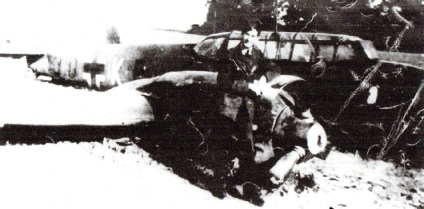 A number of enemy aircraft were shot down, I remember one at Star Lane when soldiers with rifles came and guarded it. One story is how a local baker named Les Cripps captured a German pilot at Landwick with the help of his shotgun.
A number of enemy aircraft were shot down, I remember one at Star Lane when soldiers with rifles came and guarded it. One story is how a local baker named Les Cripps captured a German pilot at Landwick with the help of his shotgun.
There were no houses opposite Victory Cottages. From upstairs we could see to Foulness. It was thought if we were invaded it would be from that direction.
We expected perhaps gliders would be used. To combat this the RAF arrived on the other side of the road with a convoy of lorries and towing trailers loaded with large red gas cylinders which we were told contained Hydrogen. Some lorries had big winches on them. Barrage balloons were unfolded, blown up and let up into the sky on wire cables. They had many wires dangling from them to get caught up in the gliders if they came and cause them to crash. I remember a serious accident when a cylinder exploded and we were told an airman lost an arm.
The RAF erected big tents where they used to sleep and live.
We had servicemen everywhere. The army erected tents at Oldbury Farm and installed big guns which they used to shoot at enemy aircraft.
At Barling Hall Farm the army built wooden huts where soldiers used to live. I never quite new what they did but believe they patrolled the sea walls in case of enemy invasion from this area. The rivers had submarine booms. The sea walls had concrete Pill boxes for soldiers to fire guns from if enemy invaders tried to get up the rivers and creeks. We seemed well protected.
On top of all this, everything was in short supply, in particular food. Everything was rationed, we all had ration books which was another worry for mother. We were perhaps lucky if there was any luck. We had a fairly large garden and could grow food. Others were less lucky. Every bit of spare ground turned into allotments. The phase “Dig for Victory” was coined. There was however, some luck. One day my mother sent me shopping and particularly asked me to get bananas which were in very short supply. I went into Freda’s greengrocers and asked. Freda shook her head and said “can’t get any”. I left the shop very disappointed. As I left Freda called after me, “You’re the boy Street aren’t you?” I replied, “Yes”. Freda handed over four bananas, a rare treat.
In 1940 I was five and started school at the tiny Barling School which had four classrooms and the same number of teachers. I remember the corridor had war time posters displayed, Dig for Victory. Coughs and sneezes spread diseases-use your handkerchief. Your country needs you. Walls have ears. The hoe is mightier than the hose.
In 1941 I had a major disaster at school. At the beginning of the war all iron railings were removed. Barling had plenty. They were stacked up ready to be taken away to make bombs and bullets. One day when I was crossing the bridge to the field I decided to climb the stack of railings, when I reached the top leaned backwards and fell back pulling a section of railing with me. This resulted in a compound fracture of my left leg. Then there were no National Health Service, no paramedics whizzing about to come to your aid. You were on your own. My mother had no money for Doctors. The school patched me up a bit and sent me home on the 4B bus in the charge of my big sister. What a terrible situation. My mother did have to call the local doctor who charged for attending me. He made splints from boxwood and left saying you had better get him to hospital but how.
At times of crisis every community needs a guardian angel. We had ours in the form of Mrs Mercer from little Wakering Hall. She was always there when needed. Mrs Mercer got me to hospital, constantly attended me and my mother whilst there and at the end of it all being an educated lady arranged payment of all bills from charitable organisations, an angel indeed.
All building work stopped. Hubbard’s were building Victory (WWI I believe) Parade at Bakers Grave, a parade of four shops with accommodation and a vehicular arch through the centre which led to Hubbard’s yard. This was boarded up and not finished until after the war, Ironically the first shop to be occupied was by Cyril Prior who had been disabled during the war.
The war continued in many countries with highs and lows. More often they were deep lows. Mrs Mercer was always there. Little Wakering Hall seemed like an open house. We had marvellous fetes on the big lawn. All sorts of games were played. Things like“Tilt the bucket”, climbing a greasy pole and others. Ladies like Mrs Merchant sang patriotic songs to the music of a wind up gramophone. Sometimes in the middle of a song the gramophone just ground to silence but no one cared. Ernie Adcock, a local builder and renowned athlete used to be given boxes of apples and other fruit from the Mercer Orchards. Ernie shouted, “Scramble-Scramble”, and threw handfuls of fruits into the crowds of kids for us to fight over.
Mrs Watson who lived in Kimberley Road used to teach us to plait the Maypole. We used any odd piece of ground. I remember practicing at the end of the creek at Kimberley Road. Mrs Watson had bad legs and used a stick. She used to get quite angry when we did it wrong, banged her stick on the ground and shouted, “No. No. No. Over and under, over and under, you must go over and under.” We did learn and plaited the Maypole on the big lawn and other places.
It took me a year to get over my broken leg. Against all odds how I managed to end up with two legs the same length I shall never know. What I do know is the skill of the surgeons and the care of Mrs Mercer could not be surpassed.
My family were really up against it and really poor. People were very kind. Jack Smith from next door use to go rabbiting and often came round with rabbits to eat. We kept rabbits ourselves and chickens. We went gleaning and wooding anything to help.
Life went on, many activities were organised. The Women’s Institute Hall at Barling was their focal point and the Village Hall at Wakering.
Many people helped us. We met a lady who we grew to call, “Auntie Salmons” who lived in a farm cottage at Barling Hall with her husband and family. I think she knew my family from when we lived round the back road. She just used to come to our house to see if we OK. Sometimes she just took us all back with her for tea. I spent long hours at Barling Hall farm. Mr Salmons worked there. It was a real farm then. In winter the cattle yard was full of bullocks. There were massive farm horses. There was a big pond and more than once went to deep and had to be hauled out again. Auntie Salmons just smiled, dried me off and didn’t tell my mum. Mr Salmons made us toys from odd pieces of wood. My prized possession was a caterpillar tractor. Of course the soldiers were of great interest and were pretty friendly.
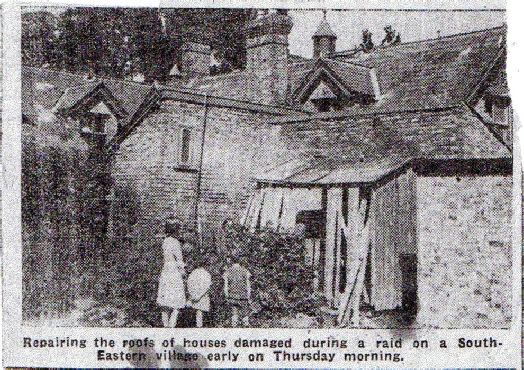 The horrors of war continued in far off places but the scars were seen here with many buildings being bombed and many casualties. The crystal clear voice of people like Vera Lynn and others were heard entertaining the troops and bringing sentimental messages to us all.
The horrors of war continued in far off places but the scars were seen here with many buildings being bombed and many casualties. The crystal clear voice of people like Vera Lynn and others were heard entertaining the troops and bringing sentimental messages to us all.
After many years the tide started to turn, we started to drive back the enemy and finally Victory in Europe was declared. The surrender was signed in the presence of Field Marshall Montgomery, one of the great architects of achieving peace.
Spontaneous celebrations broke in every town, city and village. At Bakers Grave a huge fire was lit in the road and everyone danced in the light of the fire. Traffic! Who cared about traffic. The war was over. We were at peace at last.
The last hurdle was yet to be cleared. There was still fighting in Japan. Victory wasn’t achieved here until later. Only then was the war really over.




 A new Fire Station was built at Great Wakering and housed a fire tender which used to tow a water pump. Upstairs was accommodation. The firemen were part of the Auxiliary Fire Service. They carried on with ordinary jobs but took turns to be fireman which meant sleeping at the fire station sometimes and turning out if required.
A new Fire Station was built at Great Wakering and housed a fire tender which used to tow a water pump. Upstairs was accommodation. The firemen were part of the Auxiliary Fire Service. They carried on with ordinary jobs but took turns to be fireman which meant sleeping at the fire station sometimes and turning out if required.
